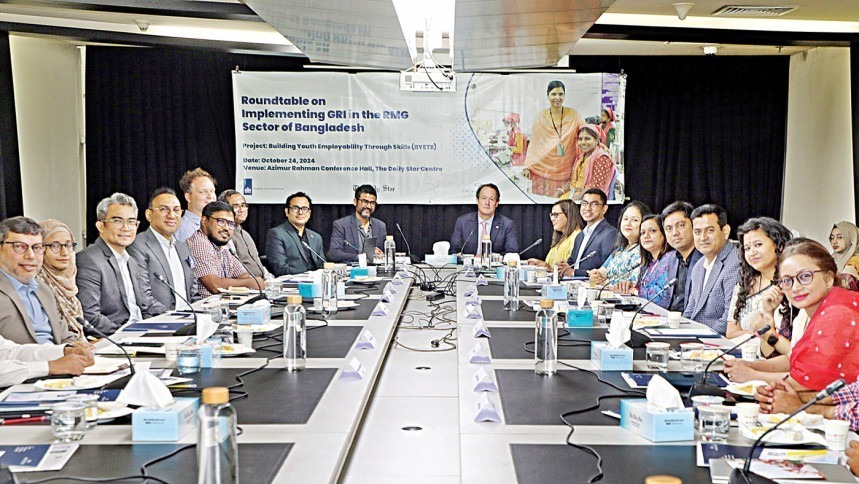RMG units struggle to adopt global reporting standards

Local garment factories are struggling to implement the Global Reporting Initiatives (GRI) standards, a set of 246 globally accepted standard issues, owing to a raft of factors, including a lack of data, local expertise, national policy directives and incentives, according to a keynote paper presented yesterday.
The GRI standards represent global best practices for reporting publicly on a range of environmental, social and governance (ESG) impacts.
But so far, only 33 local garment factories have implemented GRI standards for reporting.
The paper also said that 66 percent of global consumers, including 73 percent of millennials, are willing to pay more for sustainable goods.
By 2026, ESG-related assets under management (AuM) are expected to increase to $33.9 trillion, which would account for over one-fifth of total global AuM.
Even more importantly, the EU Sustainability Reporting Standard (ESRS) will be enforced by 2026, said Mohammad Monowar Hossain, head of sustainability at Team Group, while presenting the paper at a roundtable on “Implementing GRI in the RMG Sector of Bangladesh.”
The discussion was jointly organised by The Daily Star and Swisscontact at The Daily Star Centre in Dhaka yesterday. Tanjim Ferdous, in-charge (NGOs and foreign missions) of The Daily Star, moderated the roundtable, which featured experts, exporters, professionals, entrepreneurs and officials of different diplomatic missions.
Asif Ashraf, managing director of Urmi Garments Ltd, said the Bangladesh Garment Manufacturers and Exporters Association (BGMEA) was the first trade body in the country that had helped its members implement GRI standards in their factories.
However, many small and medium enterprises do not have the financial capabilities or human resources to implement the standards, he said.
“International retailers and brands are not ready to pay higher prices, but every such initiative costs money,” Ashraf added.
Melita Mehjabeen, a professor at the Institute of Business Administration of the University of Dhaka, said GRI standards also need to be implemented in sectors such as steel.
She added that a number of companies did not have an adequate understanding of GRI standards.
Md Akhter Hossain Apurbo, vice-president of the Bangladesh Knitwear Manufacturers and Exporters Association (BKMEA), said local exporters are eager to learn how to increase trade while adhering to rules and regulations.
However, Apurbo added that Bangladesh’s graduation from the group of least developed countries to a developing nation in 2026 may pose a challenge because of the erosion of trade preference that the country enjoys given its current status.
Mohammad Rashed, another vice-president of the BKMEA, said huge costs are associated with the implementation of such initiatives.
“Moreover, different buyers raise different compliance issues. But many small and medium enterprises do not have the capability to implement those rules and become more compliant.”
Michael Klode, project manager at the Programme for Sustainability in the Textile and Leather Sector of the GIZ, identified the unavailability of data as another barrier to the implementation of GRI standards, saying it is sometimes difficult to know what is happening in factories.
Khondaker Golam Moazzem, research director at the Centre for Policy Dialogue (CPD), said global partnerships and new rules and laws were on the horizon and that the country would have to adapt.
Although Bangladesh is still struggling with social challenges, environmental issues are being given increasing importance, he added.
“Social issues like human rights and labour rights should not be sidelined,” he said, pointing to progress in occupational safety and workers’ health and nutritional issues.
He also highlighted the lack of functional trade unions and said it is important to comply with international financial reporting standards.
Thijs Woudstra, deputy head of mission at the Embassy of the Kingdom of the Netherlands, appreciated that Bangladesh has the highest number of green garment factories in the world despite facing a lot of setbacks.
GRI is a more data-driven initiative, he said, adding that a country should be able to address these issues.
“ILO’s fundamental principles and rights at work guarantee fair and decent working conditions for all. These principles are at the core of the social reporting framework. Bangladesh’s garment industry can lead the advocacy effort for a single framework on sustainability reporting,” said Anis Nugroho, programme manager of Better Work.
He added that Better Work has been working with 100 global retailers and brands and 470 garment factories in Bangladesh.
Zahedul Hoque, managing director of Kido BD, said the country was moving in the right direction in terms of compliance, but also acknowledged challenges.
“We have to develop by ourselves,” Hoque said.
Ainee Islam, programme director at Asia Foundation, said they launched a programme named Oporajita for female garment workers in Bangladesh.
Mohammad Abdullah Yousuf Khan, programme manager at Solidaridad Network, said transparency in the whole supply chain is very important. Transparency will improve buyer confidence and suppliers can get a premium, he said.
Ikramul H Sohel, senior programme officer, market development cooperation section, Swedish International Development Cooperation Agency, said there are many requirements for implementing GRI standards. Skilled manpower is also needed, he added.
Sadril Shahjahan, senior research associate of the Centre for Entrepreneurship Development at BRAC University, said there should be a data repository for the garment sector.
It is required because it will allow those who wish to comply with and adopt GRI initiatives to learn more about it and understand the challenges, he said.
Tanzila Tajreen, senior policy adviser at the Embassy of the Kingdom of the Netherlands, said Bangladesh still has a long way to go as only 33 factories have implemented GRI standards.
“Is this an extra burden for the factories?” she asked.
Ishrat Fatema, team leader at Swisscontact, said they have multiple projects in the garment sector and some will be coming soon.
Mujibul Cezanne Hasan, country director at Swisscontact, said GRI standards are quickly becoming a requirement. It has associated costs but should be treated like an investment, Hasan said.
Sahela Akter, deputy secretary to the Ministry of Industry, also spoke.
Source: The Daily Star | 25 October 2024






